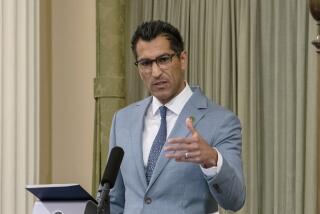Massachusetts Weighing Big Tax Hikes
BOSTON — A state legislative committee approved and sent to the House for debate Thursday $1.1 billion in tax increases to close the budget deficit that signaled the end of the “Massachusetts Miracle.”
The package of higher taxes on capital gains, sales and gasoline was approved on a voice vote by the House Ways and Means Committee. It immediately drew fire from legislators and the public.
“This bill imposes the most regressive kind of a tax, hitting hardest those in Massachusetts who can least afford it,” said Edward E. Mulligan, head of Massachusetts Electric Co.
The House put off debate on the package until today.
The proposal is the Legislature’s latest move to deal with the deficit, which a Ways and Means Committee staff member said had grown to $825 million. Only a year ago, an economic boom dubbed the Massachusetts Miracle was cited by Gov. Michael S. Dukakis during the presidential campaign. Dukakis is backing the tax increases.
As the committee sent the proposal to the House, the Senate held hearings on a $350-million House-approved package of spending cuts. Legislative leaders envision enacting the cuts in conjunction with the tax package, which has been embraced by the governor.
Under the tax package, the sales tax would rise from 5 cents to 7 cents on the dollar, the gas tax would go from 11 cents to 21 cents per gallon and the capital gains tax would be increased from 5% to 7.5%.
The package would raise nearly $1.1 billion in additional revenue by the next fiscal year. Still more revenue would be raised by shifting $30 million more in cigarette taxes into the general fund and by collecting $24 million in unclaimed returnable-bottle deposits.
The package was developed by the House leadership, and Speaker George Keverian backed it up by telling several committee chairmen that they should resign if they could not support it. One committee chairman quit Tuesday.
Democratic Rep. John McDonough spoke up for new taxes before the Ways and Means Committee vote, saying that it was time the Legislature and Administration corrected spending errors that were based on overly ambitious revenue estimates.
“At what point do we face up to the fact that we were all wrong about the deficit?” he asked.
More to Read
Sign up for Essential California
The most important California stories and recommendations in your inbox every morning.
You may occasionally receive promotional content from the Los Angeles Times.










